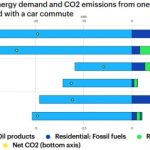The Biden administration has reintroduced Trump’s tariffs on e-bikes from China. That’s 25% tariffs on imported e-bikes and bike components made in China. An additional 25% tariff on Chinese-made battery packs used by e-bikes comes into effect in 2026. Nearly 100% of bicycles sold in the U.S. are manufactured abroad, with the vast majority coming from China. It’s all part of the U.S. policy to counteract unfair subsidies in China and develop … [Read more...]
Cutting energy usage with Behaviour Change: Covid and Russia’s war show it can happen fast
Technology alone won’t meet our net zero targets. For the foreseeable future there will always be carbon-intensive assets and hard-to-abate sectors. Only “behaviour change” by citizens worldwide can bridge the gap that technology cannot. And the reduced energy use that it delivers will also lower the targets that the rapid growth of clean energy supply are now chasing. Here the IEA lays out the challenges in its Behavioural Changes tracking … [Read more...]
New research ranks the 12 best ways to cut car use in cities
Behaviour change is as an important part of our transition journey as the clean energy revolution. Kimberly Nicholas at Lund University summarises research that has gathered together nearly 800 peer-reviewed reports and case studies from across Europe that analyse ways of reducing car use. One main challenge is to quantify the benefits so policy-makers and citizens can make evidence-based decisions on how to re-imagine city mobility. Nicholas … [Read more...]
Calculating the energy saved if home working becomes the norm, globally
The global lockdown has resulted in a jump in home working and a collapse in commuting. If, post-lockdown, this new lifestyle is widely embraced, will it mean a reduction in total energy consumption and, if so, by how much? Daniel Crow and Ariane Millot at the IEA have crunched the numbers to attempt to answer this question. The first observation is that although car use will drop, residential energy consumption will rise. This is what makes the … [Read more...]





